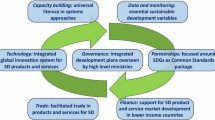Abstract
In the paper, I argue that different management approaches in International Financial Institutions (IFIs) are receptive to different economic and theoretical paradigms, which in turn lead decision makers to different design of investment, and such differences in design and investment lead to significant differences in development success. Successful development efforts lead an economy to the point where it achieves a critical mass of structural transformation and tips to the side of a sustained growth process. The paper characterizes International Financial Institutions (IFIs, also known as MFIs or Multilateral development Finance Institutions) as planning oriented and politically dominated by their governance set-up. Developing economies are complex systems. The paper outlines the complex systems development paradigm. Designing investment interventions for complex systems requires decentralized, flexible and networked institutions equipped to explore a variety of development outcomes. Experimentation, trial and error, quick replication of successful prototype investment projects, exploration of alternatives when rapid feedback shows unsatisfactory results in the field, are the hallmarks of managing a complex system. The traditional approach by IFIs to managing development is likely to lead to inferior development outcomes, as the paper demonstrates with investment examples. One path to better development investment design is the institutional establishment of management tools in the form of evolutionary, complex systems models of economies that can inform realistic and rigorous decision making, and flanked by human resource incentives that stimulate competition for ideas and success.
Similar content being viewed by others
References
Adams, J. and H.-P. Brunner (2003) “Technology and Institutions in the Process of Economic Reform: Achieving Growth with Poverty Reduction in South Asia,” Journal of Economic Issues 37. 2: 363–369.
Arthur, B. (2006) “Out-of-Equilibrium Economics and Agent-Based Modeling,” in K. Judd and L. Tesfatsion (eds) Handbook of Computational Economics, Vol. 2: Agent-Based Computational Economics, Elsevier, North-Holland.
Bar-Yam, Y. (2007) “Reducing Uncertainty to enable Better Investments and Clearer Justifications through Prediction of Impact by Multi Scale Agent Based Model, ADB in collaboration with the New England Complex Systems Institute,” Paper at the Regional Aid for Trade Conference, Manila.
- (2004) Making Things Work, NECSI Knowledge Press, Cambridge MA.
Brunner, H.-P. (2007) “Trade, Technology and Institutions: the Policy Debate in Northeast India,” Paper presented at the Allied Social Science Associations (Chicago).
- (2006) “Application of complex systems research to efforts of international development,” Proceedings of the 6th International Conference on Complex Systems (Boston MA).
- (2005) “Can evolutionary economics make a billion $ difference for 60 percent of the world’s poor in Asia?” in K. Dopfer (ed) Economics, Evolution and the State—The Governance of Complexity, Edward Elgar, Cheltenham UK and Northampton MA.
- and P. M. Allen (2005) Productivity, Competitiveness and Incomes in Asia, Edward Elgar, Cheltenham UK and Northampton MA.
Collier, P. (2006) “Why the WTO is Deadlocked: And What Can be Done About It?” The World Economy 29. 10: 1423–1449.
Coviello, D. and R. Islam (2006) “Does Aid Help Improve Economic Institutions?” World Bank Policy Research Working Paper No. 3990.
Easterly, W. (2006) “Planners vs Searchers in Foreign Aid,” Paper at the ADB Distinguished Speakers Program.
Hausmann, R. and D. Rodrik (2003) “Economic development as self-discovery,” Journal of Development Economics 72: 603–633.
Nelson, R. R. (2005) Technology, Institutions, and Economic Growth, Harvard University Press, London and Cambridge MA.
Potts, J. (2001) The New Microeconomics, Edward Elgar, Cheltenham, UK and Northampton, MA.
Rajan, R. and A. Subramanian (2005) “Aid and Growth: What Does the Cross-Country Evidence Really Show?” NBER Working Paper No. W11513.
Reddy, S. and C. Minoiu (2006) “Development Aid and Economic Growth: A Positive Lon-Run Relation,” Columbia University working paper.
Thirlwall, A. P. (2002) The Nature of Economic Growth—An Alternative Framework for Understanding the Performance of Nations. Edward Elgar, Cheltenham UK and Northampton MA.
Ulanowicz, R. (1999) “Life after Newton: An Ecological Metaphysic,” BioSystems 50: 127–142.
Author information
Authors and Affiliations
Corresponding author
Additional information
The author is solely responsible for the final content and does not speak for his institutional affiliate. The author thanks Richard Nelson, William Easterly, and an anonymous reviewer of this paper. The author also thanks the participants of the 2007 Kyoto conference of the Japan Association for Evolutionary Economics, especially Kiichiro Yagi, for their suggestions.



